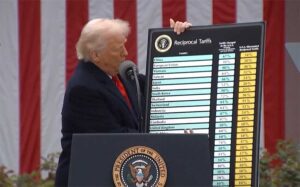President Donald Trump has signed an executive order to eliminate the long-standing de minimis tariff exemption for low-value imports into the United States—significantly increasing costs for UK exporters, global e-commerce sellers, and American consumers buying inexpensive goods from overseas.
From 29 August 2025, all goods entering the US valued under $800 will be subject to full duties, based on the country of origin and product category. The exemption, which previously allowed duty-free import of low-value packages, was a cornerstone of cross-border e-commerce and streamlined global trade.
Over the past decade, the number of low-value parcels entering the US has surged by more than 600%, according to US Customs and Border Protection. Shipments rose from 139 million in 2015 to over 1.36 billion in 2024, fuelled by the rise of e-commerce platforms like Temu and Shein, which rely on low-cost, high-volume delivery models.
The White House described the de minimis provision as a “catastrophic loophole” that enabled tariff evasion and the import of unsafe or below-market goods, including counterfeit products and synthetic opioids.
“We are ending this abuse of America’s trade laws and putting American jobs and safety first,” said a White House spokesperson.
While the order takes effect this summer, it will be made permanent on 1 July 2027 as part of the One Big Beautiful Bill Act, which aims to reshape US trade policy under Trump’s broader “America First” agenda.
The decision has sparked concern among UK exporters, particularly SMEs and e-commerce retailers, who rely on the de minimis route to ship low-cost goods into the lucrative US consumer market.
Marco Forgione, Director General of the Chartered Institute of Export & International Trade, called the move “deeply unsettling” for British businesses.
“Thousands of UK firms now face immediate new costs when trading into the US. This removes one of the few simple, low-friction routes into the American market,” he warned.
“We’re seeing a deliberate and muscular campaign by the US to rewrite the rules of global trade. From blanket tariffs to regulatory shocks, it’s becoming a riskier and more uncertain environment.”
Forgione added that UK policymakers must now consider how to defend access and competitiveness for exporters, and ensure any future review of de minimis thresholds supports jobs and protects supply chains.
Wednesday’s executive order was part of a wider set of tariff announcements by the Trump administration:
A 50% tariff on imported copper
A 25% tariff on India for purchasing Russian oil
A 40% tariff on Brazil, citing trade imbalances and unfair practices
This follows earlier moves to exclude China and Hong Kong from de minimis eligibility, in an attempt to curb the influence of Chinese e-commerce platforms and reduce reliance on overseas manufacturing.
Pharmaceutical firms have also come under pressure, with the White House reportedly writing to industry leaders demanding additional price cuts—signalling a full-spectrum trade strategy spanning tech, energy, health, and manufacturing.
What’s next?
Although the Biden administration had previously sought to limit low-cost imports through new regulations, Trump’s move is a more sweeping reform with immediate consequences for importers, retailers, and logistics providers.
UK exporters are now urged to reassess their supply chain strategies and prepare for new customs barriers. Meanwhile, industry bodies are calling for a coordinated international response to preserve the rules-based trade system and protect access for smaller businesses.
While American travellers will still be able to bring back $200 of personal items duty-free, and gifts valued under $100remain exempt, the days of effortless cross-border shopping may be numbered.
Key Change
Impact on UK Exporters
End of $800 de minimis threshold
All shipments to US now subject to import duties, regardless of value
New duties on all low-value imports
UK firms face higher costs to reach American consumers
Exemption suspended for China and Hong Kong
Popular low-cost routes like Temu or Shein excluded
Permanent change from July 2027
Businesses must prepare for permanent tariff regime
Personal and gift allowances remain
Travellers can still bring back $200 personal goods; $100 gifts remain exempt
Higher compliance costs for SMEs
Small firms must absorb or pass on new administrative and duty costs
Greater customs friction and delays
Longer customs processes likely for all parcels under $800
Risk to e-commerce business models
Online retailers reliant on high-volume, low-cost US sales under pressure
Export competitiveness impacted
Reduced price advantage may lower demand from US buyers


















